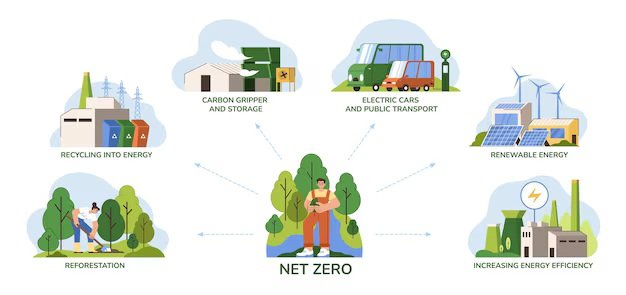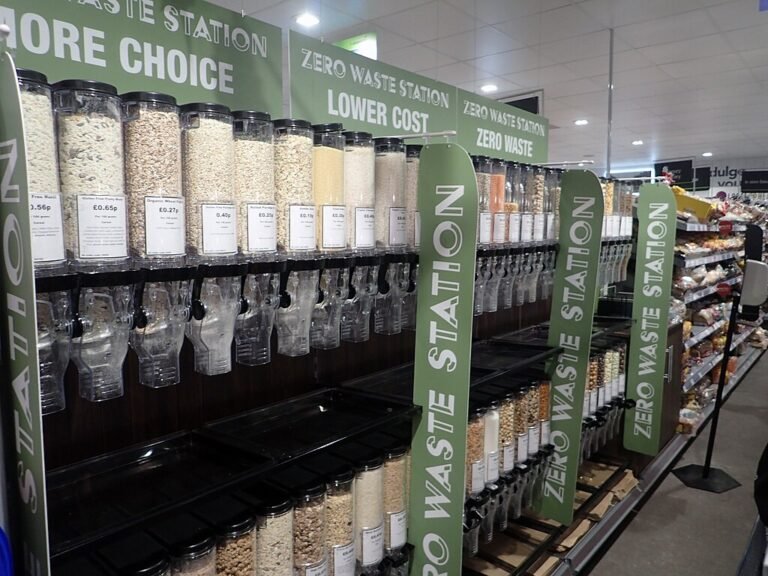Natural Grocery Stores: Examples, Sustainability and Benefits
Not too long ago, grocery shopping was pretty straightforward. You either went to a big supermarket where everything was mass-produced, or you splurged at an organic store that carried pricey, certified organic products. But things have changed. Natural grocery stores have emerged as a middle ground, catering to people who want healthier, more sustainable food options without necessarily going fully organic.
So, what exactly is a natural grocery store? How is it different from a regular supermarket or an organic store? And why should you care?
In this guide, You’ll learn what makes a grocery store “natural,” see real-world examples, and understand their impact on sustainability. Plus, I’ll share expert insights and practical shopping tips to help you make the most of your grocery trips.

In This Article
- What Are Natural Grocery Stores?
- Five Notable Natural Grocery Stores
- The Sustainability Impact of Natural Grocery Stores
- How to Shop Smarter at Natural Grocery Stores
- 1. Look Beyond the Label
- 2. Shop Local and Seasonal
- 3. Embrace Bulk Buying
- 4. Join Membership or Loyalty Programs
- 5. Bring Your Own Bags and Containers
- Conclusion:
What Are Natural Grocery Stores?
Natural grocery stores focus on food that’s as close to its original state as possible. That means fewer chemicals, minimal processing, and a strong commitment to ethical sourcing. These stores prioritise:
- Non-GMO and organic foods – While not everything may be organic, most products avoid genetically modified ingredients.
- Minimal additives and preservatives – You won’t find artificial colours, flavours, or chemical preservatives here.
- Sustainable farming and ethical sourcing – Many products come from farms that prioritise soil health, biodiversity, and fair labour practices.
- Local and seasonal produce – Instead of shipping food from thousands of miles away, they stock up on fresh, local produce whenever possible.
- Eco-conscious packaging and waste reduction – Many natural grocery stores are committed to reducing plastic waste and offering bulk buying options.
Now, you might be wondering: how is this different from an organic store?
How Are They Different from Organic Stores?
The biggest difference is that organic stores exclusively sell certified organic products. Everything on their shelves must meet organic standards set by agencies like the USDA or EU Organic Certification.
Natural grocery stores, on the other hand, offer a mix. They carry organic products, but they also stock items that may not have an official organic label but are still free from artificial additives, GMOs, or harmful chemicals. This makes them more accessible and often more affordable for shoppers looking for healthier options without going fully organic.
Five Notable Natural Grocery Stores
1. Natural Grocers (Nationwide, USA)
- Founded: 1955
- Speciality: 100% organic produce with stringent ingredient standards
Established in 1955, Natural Grocers has grown into a reputable chain known for its unwavering commitment to organic products and nutritional education. Their shelves are stocked exclusively with organic produce, ensuring customers access to the highest quality foods free from harmful pesticides and GMOs.
Customer Experience
Natural Grocers has received numerous accolades reflecting their dedication to quality and customer satisfaction. In 2024, they were honoured as the “Best Supermarket” in Newsweek’s Readers’ Choice Awards and recognised as the “Best Natural Food Store” by Green Matters.
Customers frequently praise the store’s commitment to health and education. One reviewer shared, “I love shopping here. Great selection of organic products and weekly specials. Huge selection of vitamins and supplements to aid your every ailment. The staff is very friendly and always ready to help answer questions.”
Another customer highlighted the positive atmosphere and quality offerings: “The selection is great, and employees are always friendly.”
These testimonials reflect the broader sentiment among shoppers who value Natural Grocers’ dedication to providing organic products and empowering customers through education.

2. Sprouts Farmers Market (USA)
- Founded: 2002
- Speciality: Affordable natural and organic foods
Since its inception in 2002, Sprouts Farmers Market has been on a mission to make healthy living accessible to all. By offering a wide range of natural and organic products at competitive prices, Sprouts has positioned itself as a favourite among health-conscious shoppers.
Customer Perspective
“I love Sprouts market. They provide amazing deals on produce, occasional deals of prices that no longer exist like 99 cents on apples. The selection is great too and bulk grains and herbs section is a game changer.” — Yulia Maluta, as reviewed on Reviews.io
Growth and Expansion
Sprouts has experienced significant growth, with plans to open over 300 additional stores in key states, reflecting its commitment to meeting the increasing demand for natural and organic products. The company’s focus on fresh, organic foods has contributed to its robust growth, with the stock gaining around 123% since April.

3. Earth Fare (Southeast USA)
- Founded: 1975
- Speciality: Products free from artificial fats, sweeteners, preservatives, and antibiotics
Earth Fare has been a pioneer in promoting clean eating since 1975. Their stringent guidelines ensure that all products are free from harmful additives, aligning with their mission to provide wholesome and nutritious options.
Customer Insight
Many customers appreciate Earth Fare’s dedication to clean food. For instance, the company has a policy that if a customer finds any of the 140 banned ingredients in a product on their shelves, they can receive a $50 gift card, and the product will be removed. This policy further reinforces Earth Fare’s commitment to transparency and consumer health.
Educational Initiatives
Beyond offering quality products, Earth Fare engages communities through educational programs. The company recently launched an in-store magazine called “The Clean Plate,” which provides recipes, diet information, profiles of new products, and information about current promotions. This initiative helps customers make informed dietary choices and fosters a culture of health and wellness.
4. Thrive Market (Online, USA)
- Founded: 2014
- Speciality: Online membership-based store offering affordable organic products
Thrive Market has transformed the online grocery landscape by providing a vast selection of organic and non-GMO products through a membership model. For an annual fee of $60, members gain access to over 6,000 quality items, ranging from food to cleaning supplies, at discounted prices.
Customer Experiences
Many customers appreciate the convenience and variety Thrive Market offers, especially in areas lacking access to health-focused stores. A reviewer from the New York Post highlighted the platform’s value, stating: “Thrive Market offers significant savings and healthier shopping options, making it a valuable choice for conscious consumers.”
Sustainability and Social Impact
Thrive Market is committed to eco-friendly practices, including carbon-neutral shipping and zero-waste warehouses. Additionally, for every paid membership, they donate a membership to a family in need, amplifying their positive social impact.
For a comprehensive review of Thrive Market, you might find the following video helpful:
5. Planet Organic (UK)
- Founded: 1995
- Speciality: Organic, plant-based, and eco-conscious home goods
Planet Organic has been at the forefront of promoting organic and sustainable living since 1995. Their diverse product range caters to health enthusiasts and eco-conscious consumers alike, offering everything from fresh produce to eco-friendly household items.
Customer Feedback
Many customers appreciate the store’s commitment to quality and variety. For instance, one reviewer noted:
“Great store for grabbing your healthy (or not so healthy but organic) food, cosmetics, and household cleaning products. A bit more expensive than other places, but offers a great opportunity to grab everything at once and just stock up when needed. Plus great takeaway food options.” — Tripadvisor
Another customer shared their positive experience:
“I highly recommend shopping here. The staff are very knowledgeable and informative regarding the health products and take the time to discuss possible options. There is a wide variety of food products of high quality.” — Sluurpy
Community Engagement
Beyond retail, Planet Organic actively engages with local communities through workshops, events, and partnerships, promoting health and sustainability. Their dedication to ethical practices and community involvement has solidified their reputation as a trusted destination for those seeking organic and eco-friendly products.
Learn More: Green Labelling: Definitions, Examples, and Sustainability Insights
The Sustainability Impact of Natural Grocery Stores
1. Reducing Food Waste
Food waste is a pressing issue, with approximately 40% of food produced in the U.S. going uneaten, leading to over $200 billion in losses annually. Natural grocery stores address this by collaborating closely with local farmers, ensuring that fresh produce reaches consumers promptly and minimising spoilage.
Real-World Example: The Co-op, a UK-based retailer, reported a 29% reduction in food waste between 2015 and 2018. This achievement was attributed to improved stock control systems and innovative packaging that extended product shelf life.
2. Lower Carbon Footprint
The journey food takes from farm to table significantly impacts our carbon footprint. Traditional grocery stores, with their extensive supply chains, contribute notably to greenhouse gas emissions. According to the U.S. Environmental Protection Agency (EPA), an average U.S. supermarket, typically around 46,000 square feet, emits approximately 1,383 metric tons of CO₂-equivalent annually from operations alone.
Real-World Example: Farmers’ markets and natural grocers that source locally can drastically reduce these emissions. By eliminating long-haul transportation and reducing storage needs, they offer fresher products with a smaller environmental impact.
3. Plastic-Free and Low-Waste Initiatives
Plastic pollution is a global concern, with grocery stores being significant contributors due to packaging. Natural grocery stores are leading the charge in reducing plastic usage.
Case Study: In 2024, San Francisco’s Other Avenues, a worker-owned cooperative grocery store, celebrated its 50th anniversary by reinforcing its commitment to zero-waste practices. They offer “Second Best Bags,” providing goods worth $35 for just $5, aiming to minimise food waste and make quality products accessible.
4. Supporting Ethical Farming and Fair Trade
Natural grocery stores often prioritise products from farms that employ regenerative and sustainable practices, enhancing soil health and biodiversity.
Real-World Example: Natural Grocers emphasises sourcing from vendors that practice regenerative agriculture, supporting environmental sustainability and human health.
Learn More: What are the Most Sustainable Foods?
How to Shop Smarter at Natural Grocery Stores
1. Look Beyond the Label
The term “natural” isn’t strictly regulated, meaning products labelled as such might still contain additives or be processed in ways you’d prefer to avoid. To ensure you’re making genuinely wholesome choices, familiarise yourself with specific certifications:
- USDA Organic: This label indicates that the product meets stringent standards set by the U.S. Department of Agriculture, prohibiting the use of GMOs, synthetic fertilisers, and certain pesticides.
- Non-GMO Project Verified: This certification ensures the product is free from genetically modified organisms.
- Fair Trade Certified: This label signifies that the product was produced under fair labour conditions and that the producers received fair compensation.
By seeking out these certifications, you can make more informed choices that align with your health and ethical values.
2. Shop Local and Seasonal
Opting for local and seasonal produce offers multiple benefits:
- Enhanced Flavour and Nutrition: Seasonal produce is harvested at its peak, ensuring optimal taste and nutrient content.
- Economic Savings: When fruits and vegetables are in season locally, they are often more abundant and less expensive.
- Environmental Impact: Purchasing local produce reduces the carbon footprint associated with long-distance transportation.
3. Embrace Bulk Buying
Many natural grocery stores offer bulk sections where you can purchase grains, nuts, seeds, and spices in quantities that suit your needs. This approach has several advantages:
- Cost-Effective: Buying in bulk often reduces the price per unit compared to pre-packaged items.
- Environmental Benefits: Reducing packaging waste contributes to a more sustainable shopping practice.
- Customisation: You can purchase the exact amount you need, minimising food waste.
Before shopping, consider bringing your own reusable containers to further reduce waste.
4. Join Membership or Loyalty Programs
Many natural grocery stores offer programs that provide various perks:
- Thrive Market: This online retailer offers 25-50% discounts on organic products with an annual membership fee.
- Natural Grocers: Their loyalty program provides free nutritional consultations, helping you make informed choices tailored to your health needs.
Participating in these programs can lead to significant savings and personalised shopping experiences.
5. Bring Your Own Bags and Containers
Reducing single-use plastic is a simple yet impactful step toward sustainability:
- Environmental Impact: Using reusable bags and containers decreases the demand for disposable plastics, which are harmful to the environment.
- Store Incentives: Many stores offer discounts or incentives to customers who bring their own bags.
A 2023 survey by Zero Waste International found that 52% of shoppers regularly use reusable bags, up from 35% in 2018, indicating a positive shift toward more sustainable habits.
Conclusion:
The natural grocery sector is undergoing significant transformations driven by consumer preferences and technological advancements:
Transparency and Sustainability: Today’s consumers, particularly Gen Z, are prioritising clear labelling and ethical sourcing. A survey by Whole Foods Market found that 70% of Gen Z support climate-smart agricultural practices, with many willing to pay more for sustainable products. Amber Hardy, who leads sustainability at ALDI, emphasises the importance of integrating sustainability into daily operations, highlighting ALDI’s commitment to eliminating super-polluting refrigerants by 2035 and achieving net-zero emissions by 2050.
Technological Integration: Artificial Intelligence (AI) is revolutionising inventory management and waste reduction in the food industry. For instance, AI-driven forecasting can cut food waste by up to 30% by predicting demand more accurately, thereby reducing overproduction. Companies like Winnow offer AI-enabled waste-tracking solutions that recognise food being discarded, leading to significant reductions in waste. Their technology has helped companies like Ikea and Guckenheimer cut food waste in half. Additionally, AI-powered platforms facilitate the donation or sale of surplus food, further minimising waste.
By staying informed and adapting to these changes, consumers can continue to make choices that benefit both their health and the planet.







